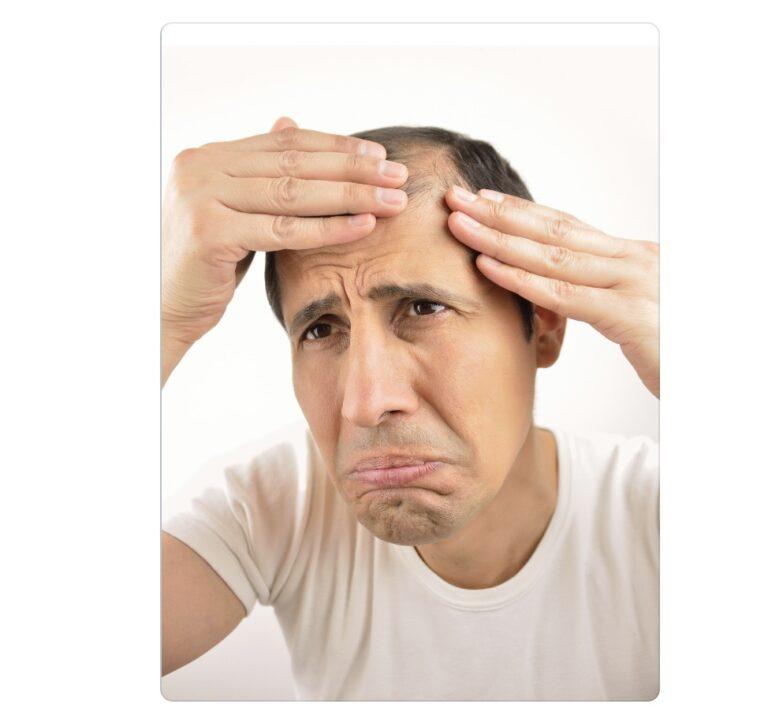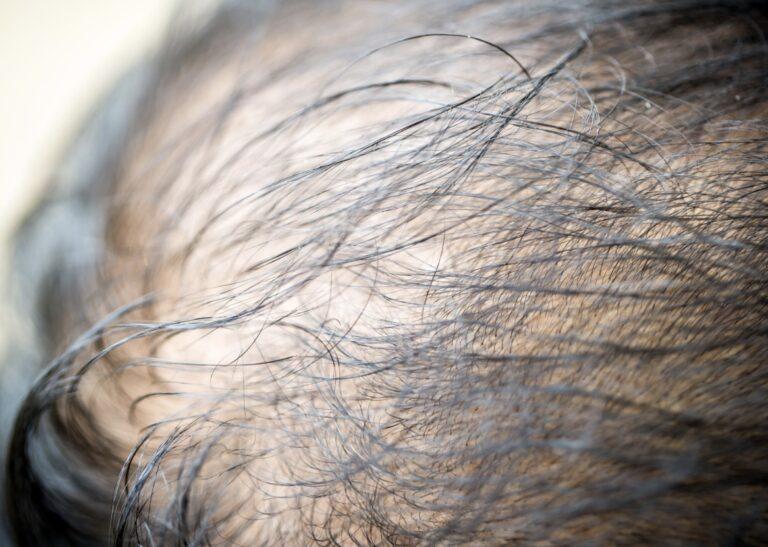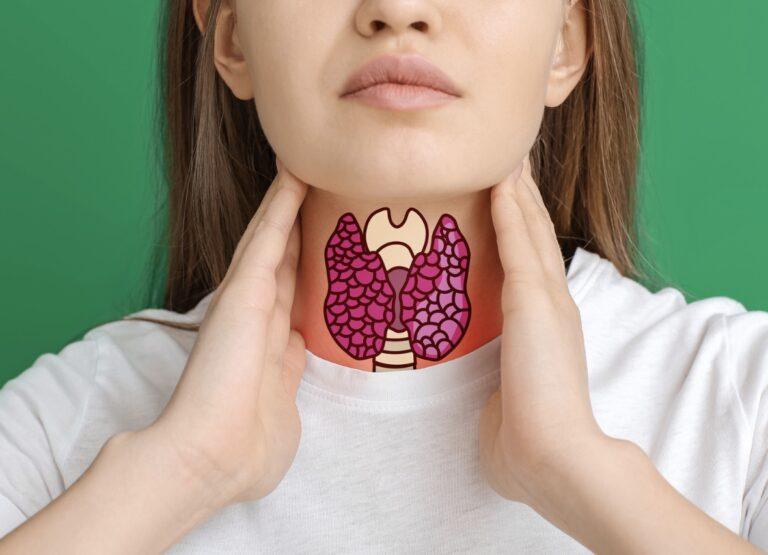Are you noticing more hair shedding than usual? It could be an early sign of alopecia. Sudden hair loss can be alarming and early detection is important. There are different types of hair loss caused by a number of different reasons. In this article, we will look at alopecia areata, a common autoimmune disorder that often results in unpredictable hair loss.
📝 What is alopecia areata?
Alopecia areata, also called patchy alopecia areata, causes hair loss in patches. It will usually happen in patches around the size of an inch, but these patches can get bigger, creating larger areas of lost hair. Alopecia areata is an autoimmune disorder in which the immune system mistakenly attacks hair follicles, causing inflammation and patches of hair loss.
Types of alopecia areata:
- Alopecia barbae: Patchy hair loss on the beard
- Alopecia ophiasis: Band or strip of hair loss on the scalp
- Alopecia totalis: Loss of all scalp hair
- Alopecia universalis: Hair loss on the entire scalp and the entire body. This is rare
🦱 Different types of hair loss
Alopecia areata
It is known alopecia areata is an autoimmune disease, but we aren’t sure why the immune system attacks the healthy hair follicles of people. This form of hair loss is characterised by bald patches on the head and loss of eyelashes, eyebrows or hair in other areas.
Alopecia androgenic (male or female pattern hair loss)
Male pattern baldness (MPB) is the most common cause of baldness in men. It results in progressive hair loss, usually starting at the back of the crown and the sides of the hairline. MPB is caused by a combination of genetics, hormones, and ageing.
Female pattern baldness starts at the parting line, sometimes appearing all over the head. Hair at the temples may also recede. Female pattern baldness is usually hereditary causing smaller follicles and thinner strands. Age and changes in hormone levels may contribute too.
Telogen effluvium
This type of hair loss is usually the result of a traumatic event, extreme stress, emotional shock, physical shock or serious illness. It may also develop due to hormonal shifts such as menopause, pregnancy or giving birth.
With Telogen effluvium more hairs than usual move into the resting and shedding phase of the hair growth cycle, so you will notice more hair falling out.
Traction alopecia
Traction alopecia is caused by wearing hairstyles tightly in pigtails, ponytails, or braids. Colouring or perming your hair can also damage your hair, which may also lead to hair loss.
What are the symptoms of alopecia areata?
- Sudden hair loss in patches. This is the common common sign of alopecia areata. You might notice smooth, round or oval bald patches appear on your scalp, beard, eyebrows or other areas with body hair. The hair loss can happen very suddenly and overnight
- Uneven hair loss. While alopecia areata typically causes circular or apathy bald spots it can sometimes appear as a more diffuse thinning of the hair across the entire scalp, particularly in women. This can be more subtle and might be mistaken for general hair loss
- Brittle nails. Changes in your nails can sometimes accompany alopecia areata. You might notice your nails pitting, developing ridges or becoming more brittle and prone to breaking
- Scalp sensitivity or itching. In some cases, people with alopecia areata experience itching or burning sensations in the areas where hair loss will soon occur
- Clumps of hair falling out. You might notice more hair coming out when you brush or comb your hair, or even small clumps of hair in the shower or on your pillow
🏥 Diagnosing
A doctor or dermatologist can give a diagnosis for hair loss. Healthcare professionals typically follow a comprehensive diagnostic approach:
Blood tests
- Complete blood count (CBC): This test measures the levels of red blood cells, haemoglobin, and other blood components, providing insights into the presence and lack of certain cells
- Ferritin, iron and transferrin levels
Physical examination and medical history
- Scalp evaluation: Healthcare professionals will closely examine the scalp for signs of hair thinning, shedding, or other abnormalities that may indicate reasons for hair loss. A scalp biopsy to check for skin disease may also be taken
- Review of medical history: Detailed information about your dietary habits, family history, if other family members have hair loss, medication use and any underlying medical conditions can help identify potential contributing factors to hair loss
Ruling out other causes
To ensure an accurate diagnosis, healthcare providers may also explore and rule out other potential causes of hair loss, such as thyroid disease, autoimmune conditions, or hormonal imbalances. People who have alopecia areata often have conditions such as asthma, dermatitis, psoriasis, vitiligo and eczema.
💉 Treatment options
There’s a range of treatment options for hair loss, but the best option for you will depend on what’s causing your hair loss. Some of the options available for alopecia areata are:
Medications
Minoxidil is a medication commonly used for pattern baldness, but is also used for alopecia areata. It can help hair to regrow or slow down its loss. Finasteride is another medication that can promote hair regrowth and slow hair loss.
JAK inhibitors (Janus kinase) such as deuruxolitinib, ritlecitinib and baricitinib are oral prescription medications used to treat alopecia areata.
Corticosteroids can be taken in different forms. Steroid injections into the scalp or applied topically into the scalp as a cream or ointment.
All these medications have side effects that need to be discussed with your healthcare provider before use.
Immunotherapy
This is used when there’s a lot of hair loss or if it happens more than once. Chemicals are applied to the scalp to produce an allergic reaction. If it works, this reaction is actually what makes the hair grow back. It also causes an itchy rash and usually has to be repeated several times to maintain the new hair growth.
Light therapy
Light therapy uses various wavelengths of light to stimulate the hair follicles and promote hair growth. This form of treatment has shown promising results, but more research is needed to establish its full effectiveness.
Improve diet
Vitamin, nutrient and iron deficiencies have been linked to hair loss. Maintaining a well-balanced diet with supplements such as vitamins, minerals, and proteins, are essential for healthy hair. Make sure you include foods rich in zinc, iron, biotin, and omega-3 to support healthy hair.
Alternative styles
Sometimes people do not respond to treatment options, you may be able to hide your hair loss with certain hairstyles, wigs or even a hair transplant.
📝 Conclusion
Alopecia areata does not generally cause physical discomfort but can cause emotional distress. However, hair loss can be difficult for many people and they may benefit from joining a support group. Currently, there is no cure for alopecia. Seek medical help from your healthcare provider who will assess the extent of hair loss and make a treatment plan.
Sources
- Hair loss – NHS
- Alopecia Areata: Symptoms, Causes, Treatment & Regrowth
- Alopecia Areata – National Alopecia Areata Foundation -NAAF
Medical Disclaimer
NowPatient has taken all reasonable steps to ensure that all material is factually accurate, complete, and current. However, the knowledge and experience of a qualified healthcare professional should always be sought after instead of using the information on this page. Before taking any drug, you should always speak to your doctor or another qualified healthcare provider.
The information provided here about medications is subject to change and is not meant to include all uses, precautions, warnings, directions, drug interactions, allergic reactions, or negative effects. The absence of warnings or other information for a particular medication does not imply that the medication or medication combination is appropriate for all patients or for all possible purposes.








